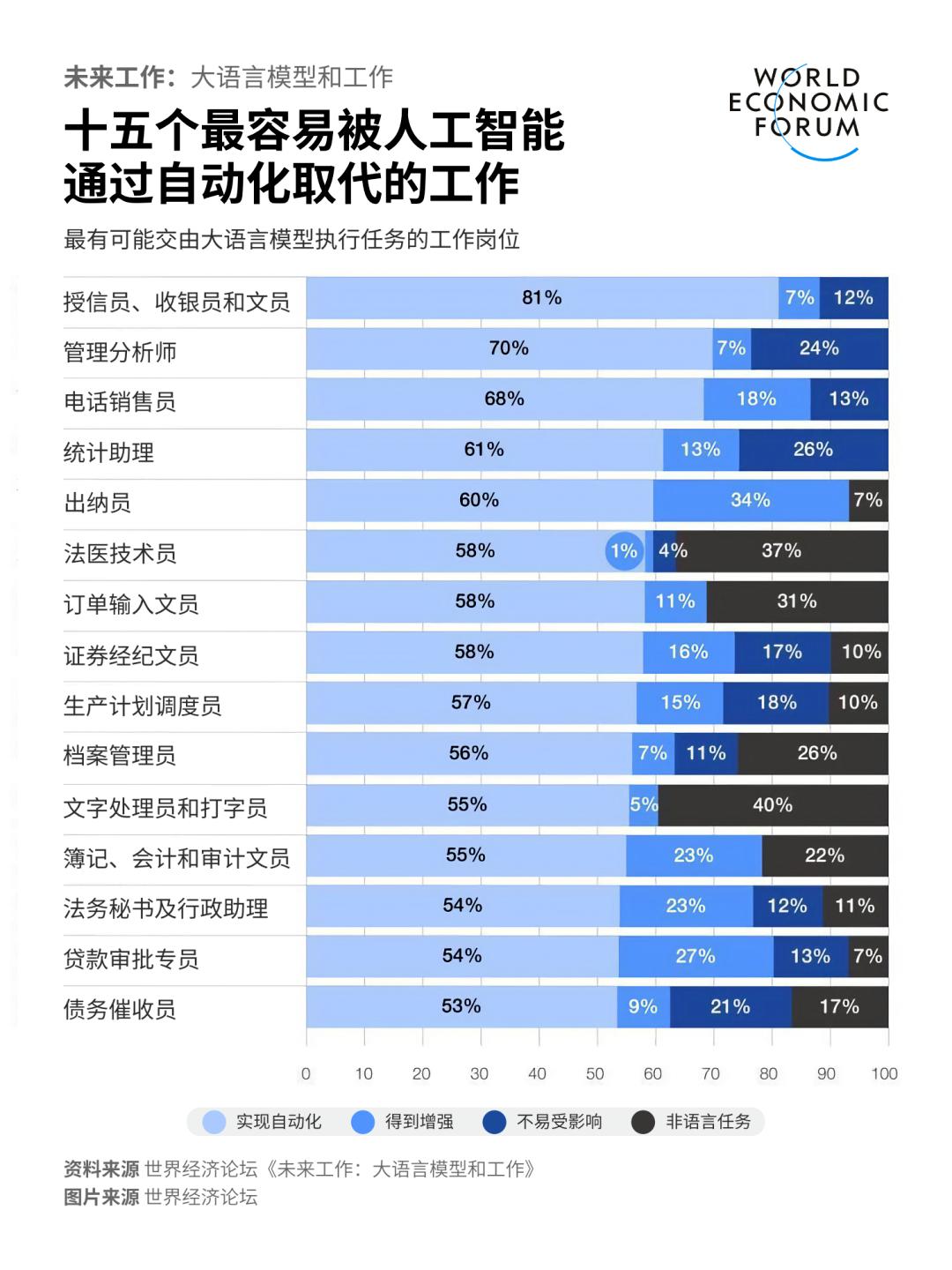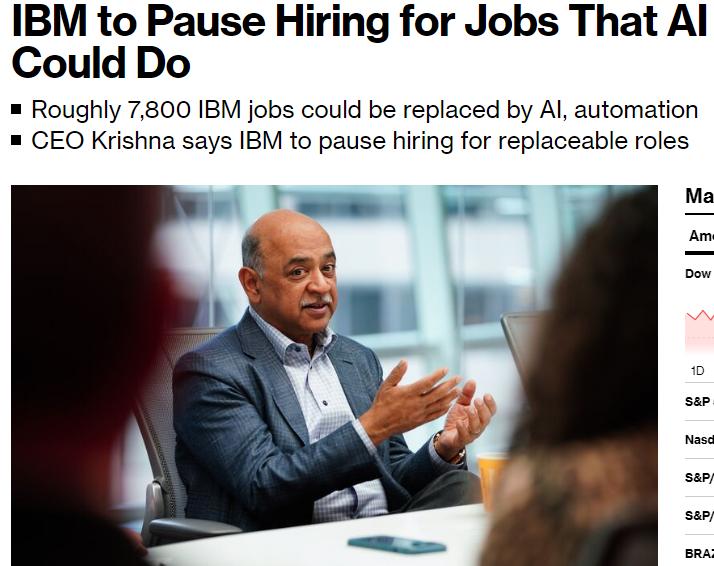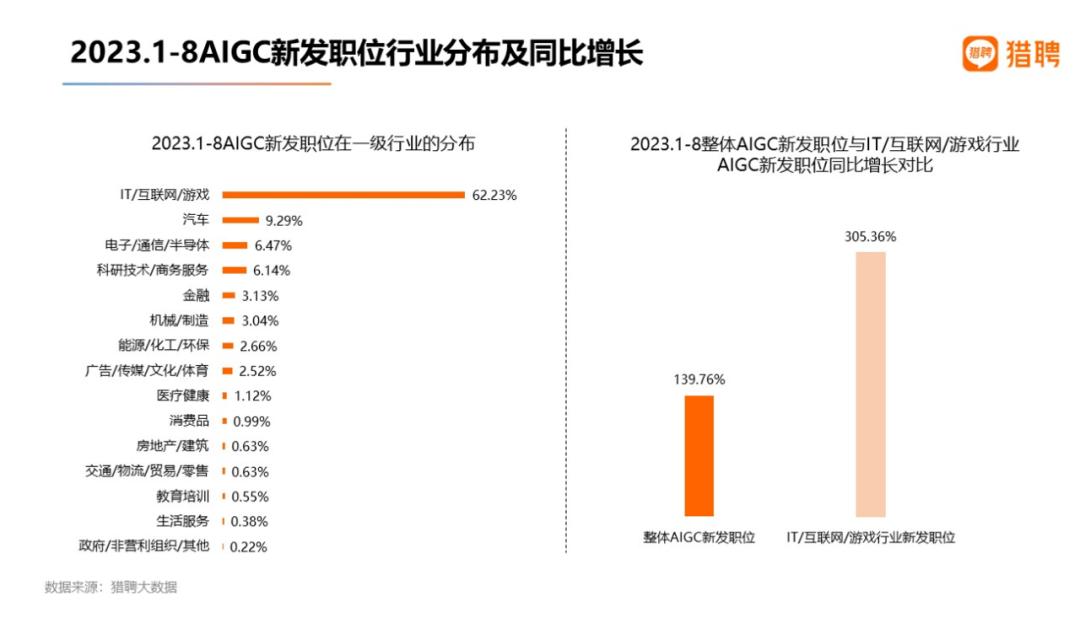The Pace of AI Replacing Human Labor is Accelerating: How Can Ordinary People Cope with Employment Challenges?
-
In 1955, the term 'artificial intelligence' was first proposed. In 1956, AI (Artificial Intelligence) was established as an academic discipline, and this year is also known as the beginning of the AI era.
2023 marks the explosive growth year of AI. The popularity of ChatGPT has brought the power of AI within reach of more ordinary people.

AI is becoming an unavoidable topic for both businesses and individuals.
No company dares to overlook this technology. Giants like Alibaba, Baidu, Tencent, and iFlytek have all entered the field at full speed. Baidu has released its generative AI product "Wenxin Yiyan", which has now iterated to version 4.0; Alibaba has integrated AI technology throughout its business lines, and recently internally released its own large model "Turing" for Taotian Group.
In October, Gartner (a U.S.-based IT research and advisory firm) released a report stating that by 2026, 80% of enterprises are expected to use AI.
AI is advancing rapidly and has become unstoppable. At the same time, this has caused career anxiety for many ordinary people, with some developing 'AI anxiety disorder'.
So, how should we respond to the incoming wave of AI?
AI replacing human labor is not just talk—it's happening right now!
Today, many companies are gradually replacing traditional customer service with AI customer service, using language models to automatically generate timely and effective responses, even creating AI customer service agents that sound just like human voices.
Without careful listening, it's hard to distinguish, and sometimes only when an identical phrase with the same tone comes from the other end of the phone do many people realize they've been talking to an AI for a long time.
Traditional robots can replace people's physical labor, while generative AI represented by ChatGPT challenges human intellectual labor.
In September this year, the World Economic Forum's white paper The Future of Jobs: Large Language Models and Employment pointed out that the jobs most at risk of being disrupted by artificial intelligence are those involving routine tasks and repetitive language work. It listed 15 jobs most likely to be replaced by AI through automation.

We have observed that office clerks, cashiers, management analysts, and telemarketers are at extremely high risk of being replaced by AI. These positions typically involve repetitive, programmable, and highly predictable tasks that don't require particularly complex skills, making them the most vulnerable to automation.
There is no denying that the pace of AI replacing human labor is accelerating.
In May of this year, U.S. tech company IBM announced that it would suspend hiring for positions that could be replaced by AI in the coming years. The company also plans to replace nearly 8,000 jobs with AI within five years.

In China, many companies have already begun having programmers use AI to write low- to mid-level code. In the future, the role of junior programmers may be at significant risk.
As the saying goes, everything has two sides. AI replacing human labor is an inevitable trend because AI technology can improve production efficiency, reduce costs, and enhance quality. However, this does not mean people will lose their jobs. On the contrary, the development of AI will also create new professions.
AI trainers are one of the new professions emerging from the rapid development of AI.
Alex, a 29-year-old with a bachelor's degree in computer science, has worked various jobs before becoming an AI trainer.

Last year, ChatGPT reached 100 million monthly active users in just two months, which suddenly made Alex realize that perhaps the AI era was upon us. Consequently, he began studying AI-related knowledge, attempting to pivot his career, and by a stroke of luck, he joined a company where he started working in AI training.
Now, his main daily work involves collecting and organizing data for model training, processing and cleaning the collected data to ensure its quality and integrity, thereby better facilitating the growth of AI models.
In addition to AI trainers, new professions such as prompt engineers, AI content operators, and AI data protection experts have emerged.
This year, the demand for AI-related positions has seen explosive growth. A report released by Liepin shows that the demand for AI talent is more than three times that of five years ago. In the first eight months of this year, the number of new AIGC job postings increased by 139.76% year-on-year. Companies are sparing no expense to attract talent, and salaries for related positions are also soaring.

As Baidu CEO Robin Li said: "While some job opportunities are gone, more opportunities have emerged."
At present, although AI cannot completely replace human labor, with the advancement of technology, nothing is certain... So, how should ordinary people respond to the AI wave? Here are four suggestions for everyone:
1. Always Keep Learning
With the continuous development of AI technology, we need to constantly learn and adapt to new technologies and work environments. You can improve your competitiveness by participating in training courses, learning new skills, understanding new technologies, and using new technologies.
2. Strengthen Interpersonal Skills
AI is procedural, while humans excel in communication skills. At work, we need to communicate and collaborate effectively with colleagues, clients, and partners—areas where AI currently finds it difficult to substitute.
3. Focus on Career Development
To adapt to constant changes, we need to continuously monitor career development trends, understand emerging professions and industries, and prepare ourselves for career advancement.
4. Cultivating Innovative Thinking
AI development requires people to possess innovative thinking and problem-solving abilities, so we need to cultivate our own innovative thinking, learn to think from different perspectives, and seek new solutions.

Looking back at history, the emergence and development of new technologies often bring short-term 'pain', but every technological revolution also brings us more opportunities, changes our way of life, and improves our quality of life.
The development of AI technology is an objective fact. For ordinary people, we must face the challenges and opportunities it brings.
Taking the initiative to run and actively embracing AI may be the best way out at present.
